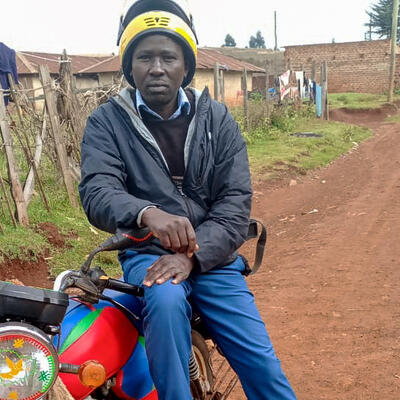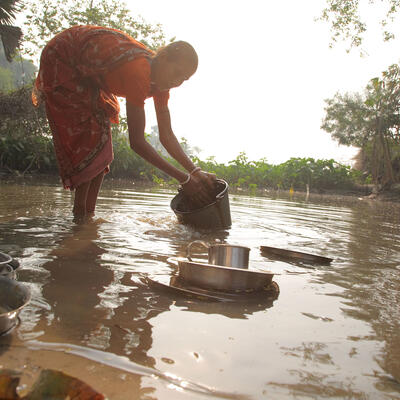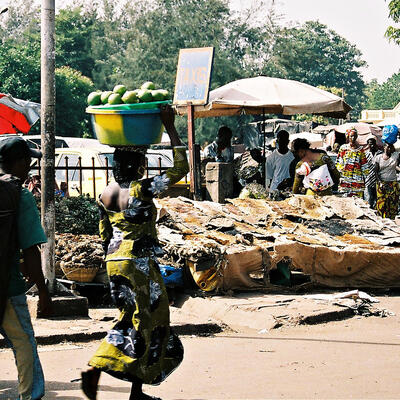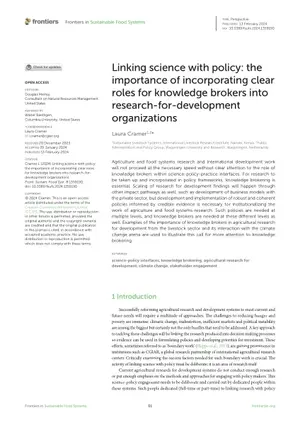
Ten questions and answers about ILRI’s Kapiti Research Station
In late 2017, several illegal attempts were made to sell parcels of land at Kapiti Research Station, located in Kenya’s Machakos County and belonging to the International Livestock Research Institute (ILRI). The Station conducts long-term research on livestock diseases and related issues of major importance to people in Kenya and throughout the developing world. Groups involved in the fraudulent land grabbing activities trespassed on the Station. Some even attempted to erect illegal structures, which were demolished by the proper authorities. More recently, on 20 October 2018, the Kenya Parliamentary Lands Committee held a hearing about Kapiti Research Station in Mavoko, Machakos County, at which some witnesses provided false testimony about their entitlement to the land and completely mischaracterized the activities and interests of Kapiti and ILRI. To be clear: No land at Kapiti is or ever has been for sale since ILRI acquired it between 1981 and 1987, when the transaction was finalized. ILRI is confident that the Lands Committee and the Kenyan legal system will vindicate ILRI’s ownership rights of Kapiti Research Station and protect the public goods research being conducted there. In the meantime, Kenya’s Director of Public Prosecutions has opened a criminal investigation of fraud and extortion to ensure that the persons responsible for these illegal acts are brought to justice. We urge the public to respect the DPP’s directive or face the consequences.
This brief Q&A is intended to set the record straight about what ILRI is, what we’re doing at Kapiti, and what makes our title to the land there so secure.

Livestock at the Kapiti ranch in Kenya on 30 Aug 2013 (photo credit: ILRI/Paul Karaimu).
- What is the Kapiti Research Station?
- What is ILRI? Who funds ILRI’s work and staff?
- What is the Kapiti land dispute about?
- What proof does ILRI have that it owns Kapiti?
- How is Kapiti benefiting Kenyans?
- Just who and what is the land grabbing putting at risk?
- What is the Kenyan legal system doing in response to these actions?
- What is ILRI doing to vindicate its ownership of Kapiti?
- Is ILRI in discussions with Machakos County about another Kapiti matter?
- Where can I get more information?
- What is the Kapiti Research Station?
Kapiti, whose full legal name is the Kapiti Plains Estate Limited, is a research station belonging to the International Livestock Research Institute (ILRI) located on 13,000 hectares of semi-arid rangeland. It is located about 60 kilometres southeast of Nairobi, along Mombasa Road near Machakos town in southeastern Kenya. Kapiti land and facilities are operated solely for public good research; this is not a commercial ranch. ILRI makes no profit from it.
The 80 ILRI staff working and living at Kapiti maintain for research purposes about about 2,500 head of Kenya’s native Boran beef cattle, 1,300 native Kenyan Red Maasai and exotic Dorper sheep, 350 Galla goats and and 35 Somali dromedaries.
These livestock are kept at Kapiti for the purpose of conducting research on animal health and productivity for the benefit of millions of farmers, herders and pastoralists in Kenya and across Africa and Asia.
- What is ILRI? Who funds ILRI’s work and staff?
ILRI is an international not-for-profit livestock research institute that for more than four decades has been working closely with national governments and ministries to conduct research to improve the livelihoods and lives of small-scale livestock keepers in Africa and Asia.
ILRI was established on 21 September 1994 as an an international not-for-profit research organization by an Establishing Agreement signed by the Governments of Kenya and Ethiopia, Denmark, Sweden, the Swiss Confederation and the United Nations Environment Programme. Under the Agreement, ILRAD (the International Laboratory for Research on Animal Diseases established in 1973 with headquarters in Nairobi) and ILCA (International Livestock Center for Africa established in1974 with headquarters in Addis Ababa) were unified to create ILRI as a single entity.
ILRI is a member of the CGIAR system, which comprises 15 global agricultural research centres and their partners conducting research for a food-secure future. The overall aims of CGIAR and ILRI are to work in partnerships to reduce rural poverty, to increase people’s food security, to improve human health and nutrition, and to ensure the sustainable management of natural resources.
ILRI funding comes from public and private organizations, governments and foundations from the North and South. The institute also receives generous in-kind support from Kenya and other countries where ILRI works. Without this broad intellectual, financial and in-kind support, ILRI could not make its contributions to better lives through livestock. ILRI has a staff of more than 600 and an annual operating budget of about KES8.3 billion.
- What is the Kapiti land dispute about?
In 2017 and in early 2018, various criminal entities fraudulently offered for sale to the unsuspecting public plots of land in Kapiti to which they had no valid title. Those persons are now being investigated for criminal fraud by the Director of Public Prosecutions.
At one point, members of the groups involved in the illegal sales trespassed and started building illegal structures on the property. They also physically threatened the 80 or so Kenyans who work and live with their families at Kapiti year-round as well as the Kenyan and international scientists who conduct experiments there. Those groups were removed from the premises by the Kenyan Police Force.
To be absolutely clear: Kapiti’s land is not and never was for sale.
- What proof does ILRI have that it owns Kapiti?
ILRI holds four legal leasehold titles for Kapiti, copies of which are lodged under lock and key with Kenya’s Lands Registry. This land was bought from a private Kenyan land owner over a period between 1981 and 1987 and the titles remain valid for decades to come. ILRI is the registered proprietor of all four parcels of land, known by registration numbers L.R. No. 7374/4, L.R. No. 8332, L.R. No. 1731/1 and L.R. No. 9918/4 situated in Machakos County.
These four contiguous parcels have been under uncontested private legal ownership since the 1960s. ILRI, out of caution and care, placed a not for sale caveat in the local newspapers on all four properties on 21 November 2017 and again on 27 October 2018 in order to avoid any unauthorized dealings on the legal titles.
- How is Kapiti benefiting Kenyans?
Kenya’s livestock sector is a vibrant and vital part of its national economy. It contributes more than 40% to Kenya’s agricultural gross domestic product, at a total value of KES515 billion, and employs 50% of the country’s agricultural labour force. Kapiti’s research on livestock health and productivity contributes to Kenya’s farmers in innumerable ways. Here are just a few:
- Smallholder Kenyan dairy incomes: Past work at Kapiti Research Station helped increase incomes for Kenya’s small-scale milk producers, processors and sellers and now generates KES3.3 billion in related benefits to Kenya annually as well as providing thousands of jobs for Kenyan youth and labourers.
- Vaccines for Kenyan livestock: The research by local and international scientists also contributed to development, production and dissemination of a widely used and highly effective vaccine against East Coast fever in cattle, which kills an unvaccinated African animal every 30 seconds. Today, researchers at Kapiti are conducting vaccine trials against other animal diseases such as Rift Valley fever and malignant catarrhal fever.
- Kenyan livestock breed improvements: ILRI scientists have recently discovered a breed of Kenyan Boran cattle resistant to East Coast fever (ECF) and are working to ensure the selection of that trait in the country’s Boran breeding programs. Thirty of the progeny were selected from Kapiti for an ECF infection trial taking place at Laikipia. Researchers are also working with local communities to cross-breed high-yielding exotic Dorper sheep with drought- and disease-resistant local red Maasai sheep to help Kenyan farmers deal with climate change.
- Kenyan livestock-wildlife ecosystems: The traditional co-existence of livestock and wildlife at Kapiti has also enabled ILRI scientists working closely for many years with a neighboring Maasai community to find ways to reduce wildlife-human conflicts and to increase the benefits wildlife provide livestock herders.
- Climate Change: Because climate change is expected to make much of Kenya’s climate drier and harsher in years to come, it is critical that Kenya, some 83% of which consists of arid and semi-arid lands, prepares itself with research that reveals new ‘climate-smart’ approaches for using its extensive dryland pastoral grazing systems to support livestock-dependent communities. Kapiti is serving as a major centre for this type of research.
- Livestock insurance for Kenyan pastoralists: ILRI, working in conjunction with the Government of Kenya, has been pioneering innovative insurance schemes protecting poor pastoralists in northern Kenya against livestock losses due to drought. A recently initiated government-run Kenya Livestock Insurance Program based on ILRI’s pilot insurance project has so far paid out about KES547 million to over 20,000 pastoralists in the region.
- Kenyan livestock greenhouse gas emissions: Researchers are also using Kapiti to determine the greenhouse gas emissions generated by Kenyan livestock. The first study of its kind in Africa, it found that African cattle are less responsible for some forms of global warming than previously believed. ILRI researchers at Kapiti are also testing new ways to feed and manage African livestock that can both increase livestock and farm yields and reduce livestock impacts on the environment.
- Just who and what is the land grabbing putting at risk?
The irresponsible and illegal actions of a few criminals are putting many people at risk. First are the people of Machakos County and elsewhere in Kenya who have been duped into thinking this land is available for purchase and stand to lose substantial amounts of money.
Second, the ongoing lawlessness risks disrupting or stopping important long-term livestock research, thereby threatening the futures of hundreds of millions of livestock producers—as well as the processors, sellers and consumers of milk and meat—across Kenya, Africa and Asia.
Third, these illegal incursions also threaten the wildlife-rich Athi-Kapiti Plains ecosystem, which is essential to the health of Nairobi National Park and other pre-eminent conservation areas in southern Kenya.
And fourth, are the 80 ILRI workers who live with their families at Kapiti and the Kenyan and international scientists who conduct their experiments at Kapiti, many of whom have been threatened with violence by the trespassers.
In brief, Kenyan people and livestock-wildlife ecosystems, as well as critical livestock research for the poor, are all now imperiled by the greedy actions of a few.
- What is the Kenyan legal system doing in response to these actions?
Kapiti is the subject of four on-going court cases at the Machakos Law Courts, two filed by Kapiti in defence of attempts by others to illegally acquire ILRI research land and two filed by the various groups claiming ownership. These cases are listed below and have court-scheduled mention dates for November 2018. Injunction orders ae also in place to maintain the status quo until these matters are heard.
- Kapiti Plains Estates Limited –Vs- The AG, NLC, Director of Survey & The New Konza Ranch Association (ELC Petition No.2 Of 2017)
- Kapiti Plains Estates Limited v Ngengya Mueke & Others (ELC NO. 35 OF 2018)
- Muthini Mwangangi & Others (Trustees of The New Konza Ranch) –Vs- Kapiti Plains Estate Limited (ELC 52 OF 2017)
- Kamulu Self Help Group & Makonza Society –VS- ILRI (ELC 81 OF 2017)
On 22 October 2018, the Director of Public Prosecutions, Noordin Haji, ordered a team of investigators to work with a team of prosecutors under the authority of a Senior Assistant Director of Public Prosecutions to ensure that the persons responsible for such illegal acts to be brought to justice.
- What is ILRI doing to vindicate its ownership of Kapiti?
In 2017, ILRI discovered that a group going by the name ‘The New Konza Ranch Association’ fraudulently obtained letters of allotment upon which they now claim to own 4047 hectares of Kapiti. It subsequently discovered that other groups including the Makonza Society, the Kamulu Self Help Group, and Makonza South attempted similar schemes. Through Kapiti Plains Estate Limited, ILRI has filed suit in the Machakos Courts to have the illegal allocations nullified. It has obtained court orders restraining the said groups from putting up any further developments on the land until the hearing of the court case scheduled now for November 2018 before the Machakos Courts.
It has repeatedly published in Kenyan newspapers Caveat Emptor, or ‘Buyer Beware’ notices, informing the Kenyan public about the illegal land grabbing at Kapiti—most recently in The Standard newspaper on 27 October 2018. It has written op-eds and letters to the editors to leading newspapers alerting the public about the potential for fraud and through its social media has advised people approached by fraudsters to follow the recommendation of the Director of Public Prosecutors and contact the relevant authorities. Its senior leadership has met with community members who unknowingly attempted to buy Kapiti land.
ILRI appreciates the dialogue with local residents and the assistance from national and county government officials, who value ILRI’s public goods mission and the important work under way at Kapiti and are helping ILRI to find a resolution to the illegal sales of its land. By protecting the important livestock research at Kapiti, the government is protecting the household savings, assets and businesses of millions of Kenyans who depend on healthy, productive farm animals.
- Is ILRI in discussions with Machakos County about another Kapiti matter?
While neither the Kenya national nor county governments dispute ILRI’s ownership of Kapiti, ILRI is currently concluding discussions with county government officials regarding a land-rate assessment for Kapiti. As a research facility of an international not-for-profit research organization, ILRI’s Kapiti holdings historically were never required or requested to pay an annual land rate. But in 2015, the Machakos County government signaled its interest in charging a land rate for the property. ILRI has paid the land rates and is waiting for a land clearance certificate.
- Where can I get more information?
For more information about ILRI, visit its website at http://www.ilri.org/ and news blog at https://news.ilri.org/. For more information about CGIAR, visit: http://www.cgiar.org/. For more information about Kapiti, see the ILRI brief about Kapiti: https://cgspace.cgiar.org/handle/10568/81323
For media information, contact David Aronson, ILRI communications, awareness, advocacy: d.aronson@cgiar.org, or 020 422 3778. For other matters, contact Ilona Gluecks, ILRI research facilities manager: i.gluecks@cgiar.org.















